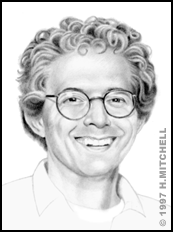David Levy
David Levy of Manhattan Beach, California, received his doctoral degree in Mechanical Engineering at MIT in 1997 and has been inventing since the age of 9. His inventions range from mechanical to medical, but perhaps the most notable is his "Micro-Miniature Ergonomic Keypad," the world's smallest "full-size" keyboard.
Levy, who worked for five years in product development at Apple Computer, took the trend toward computer miniaturization to its logical end. He designed and built a fully functional keyboard, which is forty percent smaller than a credit card, with the entire alphabet, ten digits, and thirty-one additional standard size keys.
Levy managed this seeming paradox by using keys in combination. Numbers, for example, are printed in between keys and entered by pressing the respective four neighboring keys at once. Other items are entered by pressing the contiguous corners of four keys at once. Slips in inputting are minimized because the major keys are domed. Levy's micro-keypad will surely find use in handheld computers, pagers, and telephone and fax interfaces.
Overall, Levy has earned six patents and has eight pending. He founded a corporation, TH, Inc. ("Think"), without any outside venture capital to market and license his inventions. His first patented product was "Peelables"®: peel-off labels in layers for items (videocassettes, for example) whose contents change over time. One pending patent is for a theft-proof bicycle seat. Levy's most recent invention is a method of splicing together blood vessels after surgery which eliminates the need to introduce foreign matter into the bloodstream and reduces procedure time from twenty minutes to one.
For his inventiveness and entrepreneurship, David Levy was awarded the $30,000 Lemelson-MIT Student Prize in 1996. He used the award to continue his work and to inspire others to realize that inventing can bring great personal and financial returns.


